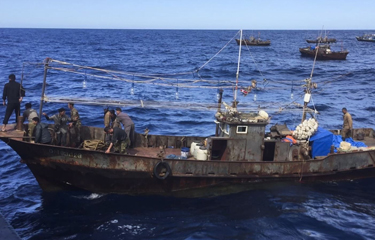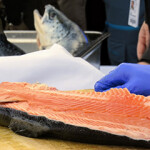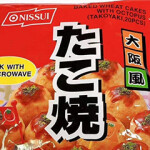North Korean illegal fishing causing headaches for Russia

Fishermen from North Korea have been illegally catching a wide range of species near the shores of the Russian Far East for more than three decades. But this year has seen much more activity, with record numbers of poachers arrested and illegal ships seized.
The sheer number of North Korean vessels fishing illegally is preventing Russian companies from fishing and may eventually cause an ecological disaster, according to the Primorye Fisheries Association, a regional non-governmental body.
The encroachments were ongoing throughout the summer, escalated in September. On 12 September alone, Russia’s Border Security Service, which is a subdivision of the Federal Security Service, detained 16 North Korean vessels and 250 fishermen illegally operating in the Russian exclusive economic zone. These 16 ships represented just a fraction of the estimated 100 vessels believed to be fishing in Russian waters on that day, but the Border Security Service acknowledged it lacked the resources to detain all of them.
On 17 September, the crisis took a violent turn, when the crew of a North Korean vessel opened fire on a Russian Border Security Service vessel attempting to board it. One Russian security officer was injured and, in response, the Russian vessel returned fire, killing one North Korean fisherman. After the North Korean vessel was apprehended, 161 fishermen were detained, with 16 of them have arrested and sent to prison and the remainder deported.
Thus far in 2019, Russia has arrested more than 3,000 North Korean fishermen for fishing in its territorial waters, up from 863 in all of 2018. More than 1,500 North Korean vessels have been boarded and searched by Russian authorities, with 47 of them found to have illegally caught squid, crab, and sharks on board.
Local fishing companies, having recently purchased new equipment and vessels in response to the national investment quota program, which offered incentives for fleet renewal, are finding themselves unable to turn a profit due to the illegal fishing problem. Before this season, a number of fishing companies in Russia’s Far East expanded into fishing squid, a fishery that had not previously been exploited due to the large investment required in new gear, with equipment for one squid-fishing vessel costing an estimated USD 1.5 million (EUR 1.3 million). But the 2019 season proved an absolute disaster for this new business; Instead of a possible catch of up to 50,000 metric tons of squid, 60 Russian vessels caught only 164 MT combined. The main reason for the catastrophe was the poaching by North Koreans, who are using drift gill-nets, which catch also young squids and thus wipe out the entire squid stock in the area, the Primorye Fisheries Association said.
Crab fishermen are suffering, too. A representative of Primcrab, a crab fishing company in the Far East, said the poachers have damaged his firm’s crab traps by cutting off floating beacons and thus making the finding of the gear more difficult.
“The poachers’ activity has increased considerably in recent years,” the Primcrab representative said. “It kills stocks.”
Alexander Sayfulin, the CEO of fishing firm RK Vostok-1, told Fishnews that the North Koreans don’t care about the damage they’re doing.
“We establish crab traps at great depth. The poachers cannot lift them and just cut off the floating beacons to get materials they need. We lose the traps, each costing nearly USD 20,000 [EUR 17,970],” Sayfulin said. “Because of that, we stopped catching crab this summer.”
In early October, the Primorye Fisheries Association appealed to Russian Deputy Prime Minister Alexey Gordeev, calling for a more robust response from the Russian government. However, Russian authorities are not capable of combating illegal, unreported, and unregulated (IUU) fishing in the Russian waters of the Sea of Japan, the Federal Security Service has repeatedly admitted, as there are just too many North Korean vessels, and their fishermen do not fear arrest, it said.
Russia has also made diplomatic efforts to negotiate an end to the illegal fishing, but equally unsuccessfully. The illegal fishing is a state-backed campaign, since fishing vessels must obtain a permission to leave port and fuel – in drastic short supply in North Korea – is tightly rationed.
During the summer, fisheries officials and diplomats from both countries held talks on the issue. In late August, the Russian ambassador to North Korea, Alexander Matsegora, told Russian media that he had talked to the North Korean Deputy Fishery Minister Kim Chan Do, urging him to crack down on the poachers and enforce an agreement on cooperation on fighting IUU signed by both countries in 2012. The North Korean official reassured Matsegora that necessary measures would be taken, he said. The issue was further discussed during a session of the Russian-Korean Fishery Commission in Moscow, attended by representatives of the North Korean’s marine military police.
But thus far, the situation has not changed, Matsegora admitted in an interview with The Russian Newspaper in early October.
In terms of next steps, Matsegora’s leverage appears to be limited due to larger geopolitical issues. North Korea remains one of Russia’s political allies, whose number significantly decreased after its annexation of Crimea in 2014. In 2004, the country wrote off 90 percent of USD 11 billion (EUR 9.88 billion) in debt held by North Korean. So Russia will tread carefully in pushing the illegal fishing issue with North Korea.
While the issue remains at a political standstill, stocks in the Sea of Japan may be straining under the weight of so much illegal fishing, according to Igor Katin, a scientist at the Far Eastern Maritime Biosphere Reserve. Katin told news agency Interfax the area is on the cusp of ecological disaster. Besides not abiding by catch limits and not avoiding juvenile fish or endangered species, North Korean fishermen are using damaging thread waste nets to fish, most of which they leave in water after fishing. Thread wastes, which are tightly-bound monofilament nets, can ensnare and kill any fish, crab, or bird that it comes into contact with.
Katin said that with satellites often showing more than 3,500 North Korean vessels fishing in Russian waters, and with each vessel using around one kilometer of thread waste, hundreds of thousands of kilometers of the damaging netting is likely accruing in the Sea of Japan.
North Korea’s illegal fishing, Katin said, may eventually end as a result, as catch numbers reduce to the point where it’s no longer financially feasible for North Korea where there’s no longer anything left to catch.
Photo courtesy of the Center for Public Relations of the Federal Security Bureau of Russia






Share